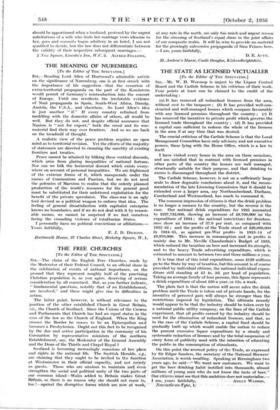THE MEANING OF NUREMBERG
[To the Editor of THE SPECTATOR.]
Sur,—Reading Lord Allen of Hurtwood's admirable article on the significance of Nuremberg, one is at first struck with the importance of his suggestion—that the cessation of extra-territorial propaganda on the part of the Komintern would permit of Germany's reintroduction into the concert of Europe. Until one recollects the irrefutable evidence of Nazi propaganda in Spain, South-West Africa, Danzig, Austria, the U.S.A., and elsewhere. So Lord Allen's idea is just another " if." If every country refrained from Meddling with the domestic affairs of others, all would be well But they do not, and despite official assurance that Nazism is " not for export," both the creed and its war- material find their way over frontiers.- And so we are back on the treadmill of thought.
A realistic view of the peace problem requires an open mind as to territorial revision. Yet the efforts of the majority of statesmen are directed to ensuring the sanctity of existing frontiers and treaties.
Peace cannot be attained by bilking these vertical discords, which arise from glaring inequalities of national fortune. Nor can we bilk the horizontal discord which exists every- where on account of personal inequalities. We are frightened of the extreme forms of it, which masquerade under the names of Communism and Fascism, but we do not need the polemics of Marxism to realise that the orderly planned production of the world's resources for the general good must be substituted for their unfettered exploitation for the . benefit of the private speculator. The class-war is an ugly tool devised as a political weapon to enforce that idea. The feeling of general dissatisfaction with capitalist enterprise knows no boundaries, and if we do not deal with it by reason- able means, we cannot be surprised if we find_ ourselves facing the crusading violence of totalitarian States.
I personally have no political convictions or affiliations.—
Yours faithfully, • • F. J. D. DICKINS. Dartmouth House, 37 Charles Street, Berkeley Square, W.1.










































 Previous page
Previous page